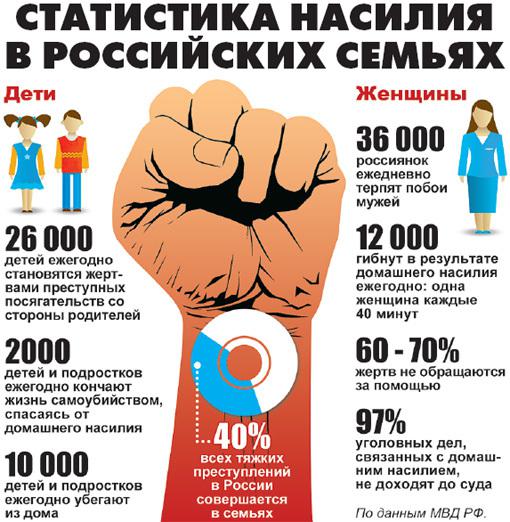By Slava Tsukerman

The above poster shows official statistics presented by Russian Ministry of Interior.
According to this data every day 36,000 Russian women and 26,000 Russian children are subjected to domestic violence. Twelve-thousand women are killed annually by their partners: one woman every 40 minutes. Two thousand children annually commit suicide and 10,000 run away from their families. Forty percent of all the violent crimes, which reached courts in Russia are cases of domestic violence. Ninety seven percent of criminal cases concerning domestic violence in Russia do not reach courts.
The Amnesty International Report asserted: Every third Russian woman is regularly beaten by her partner.
Probability of being killed by her partner is 5 times higher for Russian woman, then for European and 2.5 time higher then for American.
In Russia traditionally domestic violence is seen as something related to the private life of spouses, so police and authorities in such cases do not interfere.
Anastasia Khodyreva, an activist of Crisiscenter.ru , the crisis center, which is helping women subjected to violence, said:
“We have never had a properly functioning system of assistance to women exposed to violence. Unfortunately, in recent years the situation has worsened due to the economic crisis. And the lack of financial support affects primarily the most vulnerable groups of the population.”
Human rights activists are struggling for a long time to change the situation. Finally State Duma decided to pay attention to the subject. Results though were unexpected.
On January 11, the State Duma in the first reading, decided to move the category of the first time domestic assault from the criminal to civil offenses.
Now, if a person has beaten up his spouse (or children, or his old mother) for the first time, “acts causing physical pain but not leading to short-term impairment of health and disability”, will be considered not criminal but only a civil offense. Repeated offense still will be considered criminal.
Elena Mizulina, a member of the Russian Parliament since 1995, who was the force behind a set of controversial laws concerning the rights of the LGBT community in Russia and the adoption of Russian orphan children by foreigners, explained:
“The punishment must not contradict the national system of social values. Decriminalization of beatings will protect families from unjustified invasion and defend the traditional family.”
Vladimir Zhirinovsky, one of the most influential Russian politicians, leader of the Liberal Democratic Party of Russia, a long-time member of the State Duma, who held the post of Deputy Chairman of the Duma from 2000 to 2011, said:
“Half of inmates in Russian prisons are punished as participants of domestic quarrels. A man had hit a woman on her head with a frying pan or she thrown a frying pan to his head. He had died, she is in prison, and their child is in an orphanage. This is a classic version of mockery of the family. In case of light beating, imprisonment is a wrong punishment. We should find another form of punishment.”
Some commentators fear that as a result of the new law domestic violence will further increase.
The author of the bill, Olga Batalina, is one of major Russian campaigners for the moral principals of Russian family and against “the corruption of moral values and lack of spirituality in the West.” She is a recipient of the Chevalier medal “For Service to Motherland.” She explained:
“It should be considered that there are many different motivations for beating. Beatings will not become socially encouraged as a result of the new law. They are still going to be punished severely enough, but not as criminal actions. The Civil Code provides three types of liability in case of beatings: a serious penalty of up to 30,000 rubles ($500), the possibility of arrest up to 15 days and community service up to 120 hours. If these measures would not stop the offender and he will commit the offense again, he will be prosecuted as a criminal.”
The history of creation of this new law is interesting. Last summer Duma decriminalized assaults in the streets. Then the members of the Parliament realized that they created a very odd situation: one can beat up strangers in the street, but cannot touch relatives in one’s own home. So the new law was just an attempt to improve the previous one. Now, after approving the bill on its first reading, the members of Duma realized that the law has still some shortcomings. They are preparing a new package of amendments, excluding from decriminalization the beatings of pregnant and “helpless” (for example sleeping) persons. The next draft of the law is going to permit beating women only in case if they are not pregnant and not sleeping.
Three hundred and sixty-eight members of Duma voted in favor of the law, one against and one abstained. The second reading of the bill will take place in coming weeks. At this coming session 150 (!) other bills are going to be considered along with this one.
One can think that Russian justice is soft on abuse of women only in case of domestic violence. It is not so. Here is one of the cases widely publicized last year.
Forty-three year old Igor Provkin, a bank owner and a former representative of Republic of Kalmykia in the Federation Council (Russian Senate), driving at night in the center of Moscow, spotted through the window of his Lexus GX 460 a good looking 24 years old girl walking on the street.
The girl, Marina, graduated that day from University and, dressed up, was heading to a restaurant to celebrate the happy event with her classmates.
Provkin offered to give the girl a lift. When she agreed, the man has delivered her not to the restaurant, but into a dark alley and raped her. The Court found out that in the process of abuse the politician had severely beaten up his victim, inflicting blows to the abdomen and back. Also it became known that Provkin was accused of similar actions before.
The former senator condemned his own act in Court and blamed it on the stress from his family event and evil spirits. Igor Provkin explained to the Court: “I’m very sorry about what happened, I was like possessed by a demon. I fully repent and admit my guilt. I recently had a baby, for me it was a stress, maybe that’s why I did it, but either way I’m guilty. “
The crime committed by the banker and former senator is punishable according to the Article 132 of the Criminal Code by up to 20 years in prison.
The Court though found possible to replace imprisonment with four years probation.
Are the Russian Courts so liberal in all cases? Not at all. According to statistics only 0.5% of the accused get the full acquittal of Russian judges!




